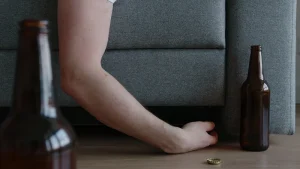
The severity of the condition is gauged by the number of symptoms present. The presence of two to three symptoms generally indicates a mild condition; four to five symptoms indicate a moderate disorder. When six or more symptoms are present, the condition is considered severe. Substances and certain activities affect your brain, especially the reward center of your brain. Support can go a long way in making the recovery process more successful.
Drug Addiction Treatment Options
At that point, the brain relies on substances to trigger the release of dopamine. And that is when individuals start to use alcohol and other drugs just to feel “normal.” It may be done by family and friends in consultation with a health care provider or mental health professional such as a licensed alcohol and drug counselor, or directed by an intervention professional.
There are many routes for recovery, and the road may take time
You can find these lines listed on the internet or in the phone book. It is unlikely that a person will become addicted after using a substance once, although it is possible to develop a mental health problem or to die of an overdose or another complication after one use of some substances. For many others, quitting can lead to unpleasant withdrawal symptoms, even with behaviors, and can open up uncomfortable feelings that were being soothed or suppressed by the addictive behavior. Addiction is a complex, chronic brain condition influenced by genes and the environment that is characterized by substance use or compulsive actions that continue despite harmful consequences. With daily or near-daily substance use, a person’s body becomes physically dependent on the drug(s) of choice. As a substance leaves the body, physical dependence leads to drug cravings and subsequent withdrawal symptoms.
- Behavioral scientists continue to study the similarities and differences between substance addictions, behavioral addictions and other compulsive behavior conditions like obsessive-compulsive disorder (OCD) and bulimia nervosa.
- Sometimes people talk about addiction in a way that makes it seem like a moral failure—like people who struggle with addiction are “selfish” or “bad.” But addiction is actually a disorder of the brain.
- Addiction “hijacks” the reward pathways of your brain 1, making it physically more difficult to make healthy choices about your substance use.
- Learn more on the progression of substance use disorder in our guide to the stages of addiction.
Can I prevent developing an addiction?
Many people recognize the negative impact drugs and alcohol have on their lives and decide to cut back or quit on their own. Once things progress to the point of addiction, it becomes extremely difficult to stop without help. Families are profoundly affected by the harmful consequences of addiction. To cope with the chaos of a loved one’s addictive behaviors, families tend to keep secrets, find scapegoats and adopt unhealthy behaviors such as denial, blame or preoccupation. So families need help in their own right to recognize and address addictive behaviors and establish healthy boundaries and relationships. Despite these advances, misconceptions about why people become addicted or a lack of understanding about how drug use changes the brain persist.
Terminological distinctions have become all the more important with the growing emphasis on multidisciplinary research and treatment approaches, as researchers and clinicians must be able to communicate effectively across disciplines. Articles in this issue of Alcohol Research & Health examine aspects of AODUDs from the perspective of some of these varied disciplines. However, given the pros and cons of the use of the terms dependence and addiction, as well as the absence of a clear consensus on which is preferred, in this volume the terms are used more or less interchangeably. The arts can be used in a variety of ways to address issues related to addiction.
- Although they may not fully commit, they weigh the costs and benefits of making a shift.
- Risk and protective factors may be either environmental or biological.
- Two people may start out using alcohol or other drugs similarly, with one person’s use progressing into a substance use disorder while the other person doesn’t develop symptoms.
- There’s not a single cause of addiction — it’s a very complex condition.
Can You Fully Recover from Addiction to Alcohol or Other Drugs?
Treatments will focus on helping you or the person you know stop seeking and engaging in their addiction. But just because addiction runs in the family does not necessarily mean a person will develop one. People struggling with addiction usually deny they have a problem and hesitate to seek treatment. An intervention presents a loved one with a structured opportunity to make changes before things get even worse and can motivate someone to seek or accept help. Opioids are narcotic, painkilling drugs produced from opium or made synthetically. This class of drugs includes, among others, heroin, morphine, codeine, methadone, fentanyl and oxycodone.
- The DSM-5 doesn’t currently include other behavioral addictions due to a lack of research on them.
- This form of addiction can be particularly dangerous because individuals may not initially recognize the symptoms of dependence or abuse.
- The approach that will be best for you depends on many factors and is best decided in collaboration with your doctor or therapist.
- In reality, drug addiction is a complex disease, and quitting usually takes more than good intentions or a strong will.
The American Psychiatric Association’s Diagnostic and Statistical Manual of what is alcoholism Mental Disorders (DSM-5) has concrete diagnostic criteria for substance use disorders. Environment and culture also play a role in how a person responds to a substance or behavior. A lack or disruption in a person’s social support system can lead to substance or behavioral addiction.

Use of hallucinogens can produce different signs and symptoms, depending on the drug. The most common hallucinogens are lysergic acid diethylamide (LSD) and phencyclidine (PCP). Substituted cathinones can be eaten, snorted, inhaled or injected and are highly addictive.

Why do some people become addicted to drugs while others don’t?
These symptoms can result in impaired control, social impairment, risky use, and tolerance/withdrawal. Both substance use disorders and gambling behaviors have an increased likelihood of being accompanied by mental health conditions such as =https://ecosoberhouse.com/ depression and anxiety, or other pre-existing problems. Substance use and gambling disorders not only engage the same brain mechanisms, they respond to many of the same treatment approaches.

- You’ll soon start receiving the latest Mayo Clinic health information you requested in your inbox.
- With appropriate treatment, people with addictions can go on to live happy, healthy lives.
- Regardless of the treatment approach, each method offers education about addiction and recovery.
- Dr. Cruz and colleagues’ article reviews the neurobiological mechanisms of addiction and how they may influence co-morbid AOD use.
- Both substance use disorders and gambling behaviors have an increased likelihood of being accompanied by mental health conditions such as depression and anxiety, or other pre-existing problems.
- Substances such as alcohol, marijuana and nicotine also are considered drugs.
Each attempt provides an addiction vs dependence important learning opportunity that changes experience and, despite the difficulties, moves recovering people closer to their objectives. There are many pathways into addiction and many routes to recovery. Think about recovery from addiction as a five-year process that will have its ups and downs; after about five years, life can and will be very different. Addiction is a chronic (lifelong) condition that involves compulsive seeking and taking of a substance or performing of an activity despite negative or harmful consequences. Most drugs affect the brain’s “reward circuit,” causing euphoria as well as flooding it with the chemical messenger dopamine. A properly functioning reward system motivates a person to repeat behaviors needed to thrive, such as eating and spending time with loved ones.